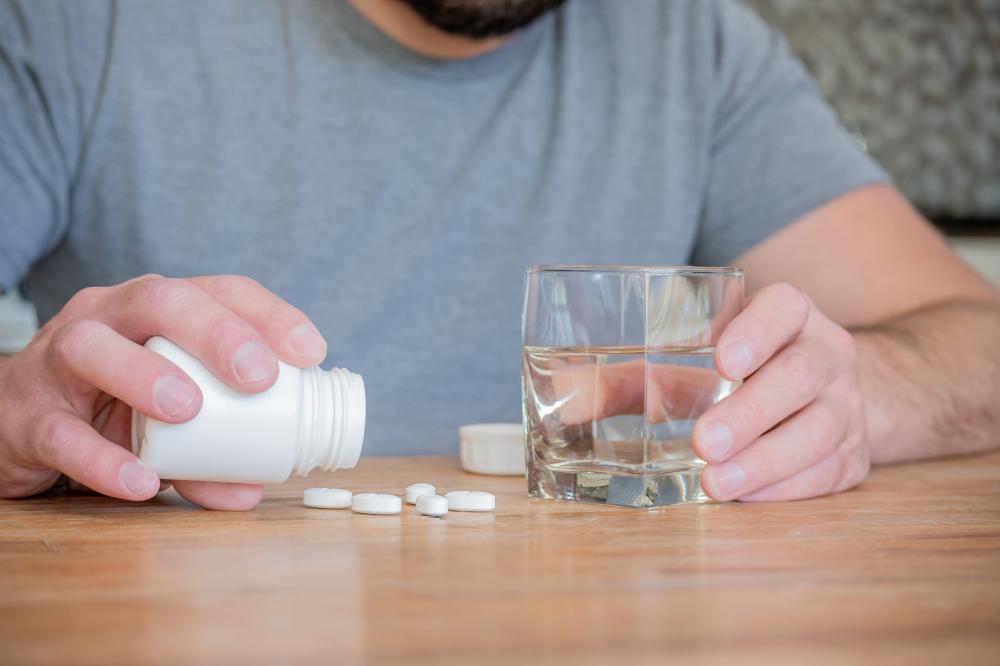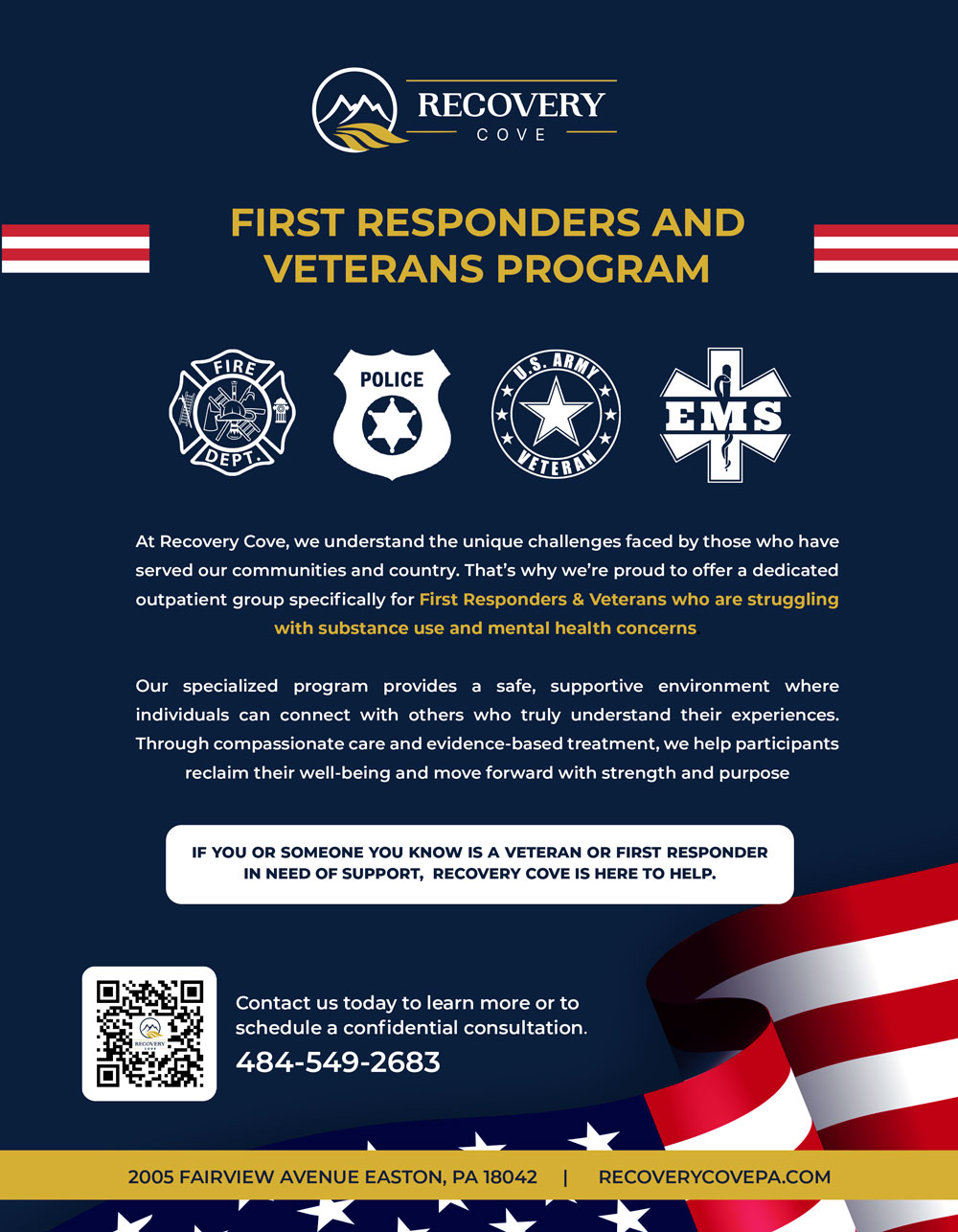
Help for Substance Use Disorder
At Recovery Cove, we view Substance Use Disorder (SUD) as a complex condition that affects the mind, body, and spirit. It is not simply a matter of willpower or morality but a medical condition that requires comprehensive treatment. Our approach to Substance Use Disorder Treatment Lehigh Valley acknowledges the multifaceted nature of addiction.
Substance use disorder can derail lives, affecting one's health, relationships, and ability to work or study. It's a disease that whispers false promises of relief and escape, only to leave chaos in its wake. At Recovery Cove, we believe in offering a path to recovery that addresses the underlying causes of addiction, providing hope and healing to those in need.
Holistic Approach to Treatment
Our philosophy at Recovery Cove centers on a holistic treatment model. This means we don't just treat the symptoms of substance use disorder; we treat the whole person. Our Substance Use Disorder Treatment Lehigh Valley program includes therapy, medication-assisted treatment, and activities designed to heal the body and soul.
From yoga and meditation to nutritional counseling, we incorporate practices that restore balance and promote wellness. Our serene setting offers a sanctuary away from the triggers and turmoil of everyday life, allowing individuals to focus fully on their recovery journey.
It's been my experience that when individuals engage in holistic care, they discover strengths and resources within themselves they were previously unaware of. This empowerment is a critical component of lasting recovery.
Personalized Care
At Recovery Cove, we understand that each person's journey to recovery is unique. That's why our treatment plans are customized to meet the specific needs of each individual. Upon entering our program, clients undergo a comprehensive assessment that helps our team determine the most effective strategies for their recovery.
Whether it's participating in our Partial Hospitalization Program, engaging in intensive outpatient therapy, or benefiting from medication-assisted treatment, clients receive care that is tailored to their unique situation. This personalized approach ensures that each person receives the support they need to overcome the challenges of substance use disorder.
Community and Support
The journey to recovery is not one that should be walked alone. At Recovery Cove, we foster a sense of community and belonging among our clients. Through group therapy sessions and shared activities, individuals build connections and learn from each other's experiences.
Support extends beyond our clients to include their families. We offer family-focused services that educate loved ones on how to best support the recovery process while also caring for their own well-being. This comprehensive support network is vital in creating a foundation for long-term recovery.
Breaking the Stigma
One of the greatest barriers to seeking treatment for substance use disorder is the stigma associated with addiction. At Recovery Cove, we are committed to changing the conversation around addiction and recovery. Through education and outreach, we work to dispel myths and promote understanding.
Our blog serves as a resource for both individuals struggling with substance use disorders and their loved ones. By sharing stories of recovery and providing evidence-based information, we aim to break down the walls of stigma and encourage more people to seek help.
Success Stories
The testimonials from those who've walked through our doors and found a new path in life are a source of inspiration. From Monica, who found the strength to rebuild her life, to Meir, who discovered a sense of peace he never knew was possible, the stories of our clients are a testament to the transformative power of compassionate, comprehensive care.
These narratives not only highlight the effectiveness of our Substance Use Disorder Treatment Lehigh Valley program but also offer hope to those still struggling. Knowing that recovery is possible can be the first step on the path to healing.

What is the most common treatment for substance use disorder?
When it comes to treating substance use disorder (SUD), there is no one-size-fits-all solution. However, a highly effective and commonly utilized approach is a combination of medication-assisted treatment (MAT) and behavioral therapies. At Recovery Cove, we've seen firsthand how this dual approach can lead to meaningful, long-lasting recovery. MAT helps manage withdrawal symptoms and cravings, making it easier for clients to engage in therapy and other healing activities. Coupled with individual and group therapy sessions, this comprehensive method addresses not just the physical aspects of addiction, but the psychological ones as well. It's about equipping our clients with the tools they need to navigate their recovery both during and after their time with us. So, have you or a loved one struggled with traditional recovery methods before? If so, this holistic approach might be the game-changer you're looking for.
What are three healthy alternatives to using drugs?
Seeking alternatives to using drugs is a crucial step in both recovery and preventive strategies. At Recovery Cove, we encourage exploring activities that nourish the body, mind, and spirit. First, physical exercise, be it yoga, hiking, or swimming, not only improves physical health but also releases endorphins, which help to combat stress and enhance mood. Secondly, creative outlets like painting, writing, or playing music can provide a way to express emotions and experiences in a therapeutic manner. Finally, mindfulness practices, including meditation and deep-breathing exercises, can significantly reduce anxiety and cravings by fostering a state of calm and present awareness. Have you tried integrating these activities into your daily routine? They might just open up a new pathway to wellness you hadn't considered before.
What is substance abuse in psychology?
From a psychological standpoint, substance abuse can be seen as the result of complex interplay between an individual's mental health, their environment, and their learned behaviors. It often serves as a maladaptive way to cope with stress, trauma, and emotional pain. At its core, substance abuse signifies an attempt to escape reality, numb painful feelings, or alleviate mental health disorders such as depression and anxiety. Recognizing this, we at Recovery Cove, place a significant emphasis on addressing the root psychological causes of addiction. Through therapies like Cognitive Behavioral Therapy (CBT) and Dialectical Behavior Therapy (DBT), we help our clients develop healthier coping mechanisms. By tackling the psychological aspect of substance abuse, we aim not only for sobriety but also for a meaningful and sustained mental health improvement. Have you considered how emotional well-being is linked to substance use in your life or the life of someone you care about?
What are substance use disorders?
Substance use disorders (SUDs) are complex conditions characterized by the compulsive use of substances despite harmful consequences. They are medical illnesses that affect the brain and behavior, leading to an inability to control substance use. SUDs range from mild to severe and cover misuse of substances such as alcohol, prescription medications, and illicit drugs. At Recovery Cove, we understand that SUDs stem from a combination of genetic, environmental, and psychological factors. Our approach to treating SUDs involves a holistic and personalized care plan to address each individual's needs, understanding that the journey to recovery varies from person to person. Do you or someone you know struggle with controlling substance use? It's important to know that SUDs are treatable, and recovery is within reach.
How significant is the role of community and support in recovery from substance use disorder?
The role of community and support in the recovery process from substance use disorder cannot be overstated. Recovery is not a journey to be undertaken in isolation. The sense of belonging, understanding, and shared experience within a supportive community significantly enhances the recovery process. At Recovery Cove, we foster a warm, welcoming environment where individuals can connect, share their stories, and learn from each other's experiences. Group therapy sessions and familial involvement are integral parts of our program, reinforcing the idea that recovery is a collective endeavor. The encouragement and accountability these groups provide are invaluable. Experiencing recovery alongside others can instill hope and demonstrate that overcoming addiction is possible. Have you experienced the power of community in facing life's challenges?
Resources
- Substance Abuse and Mental Health Services Administration (SAMHSA) - SAMHSA is the leading agency within the U.S. Department of Health and Human Services that works to reduce the impact of substance abuse and mental illness on America's communities.
- National Institute on Drug Abuse (NIDA) - NIDA is a government agency that conducts research on the health aspects of drug abuse and addiction and provides valuable information on effective treatment approaches.
- National Council on Alcoholism and Drug Dependence (NCADD) - NCADD is a nonprofit organization dedicated to raising awareness of alcoholism and drug dependence issues and providing resources for individuals and families affected by addiction.
- American Psychiatric Association (APA) - The APA is the leading psychiatric organization in the world, providing resources and guidelines for the treatment of substance use disorders and other mental health conditions.
- National Institutes of Health (NIH) - The NIH is the primary agency for conducting and supporting medical research, including studies on substance use disorder and addiction treatment methods.









